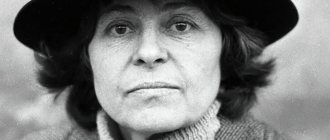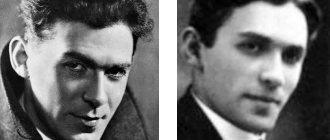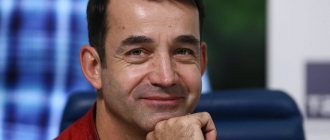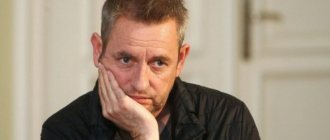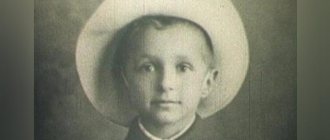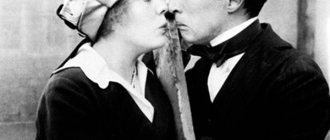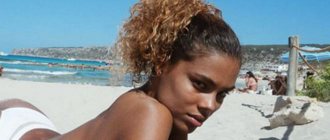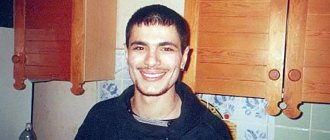Biography
For hip-hop fans, his name has become a legend. Tupac Amaru Shakur, 2Pac, Makaveli - under these stage names he became famous and recorded albums, two of which went platinum. The artist has sold more than 70 million records. Tupac Shakur is one of the top 100 best-selling and most popular musicians of all time.
Lisane Parish Crooks, the name of the hip-hop star, was born in the summer of 1971 in Harlem. The boy received the name Tupac at baptism. This was the name of a descendant of an Indian chief who fought for freedom in Peru. And the boy got the surname Shakur from his stepfather. The father left the family without waiting for the birth of his son.
Rapper Tupac Shakur
Mother often moved from place to place. Afeni Shakur was an activist in the movement that defended the rights of blacks. Tupac later joined the Black Panther organization.
Tupac Shakur received his primary education in Baltimore, at the School for the Arts. Here the boy studied the basics of acting, learned to dance and received a musical certificate. The list of subjects studied included poetry, jazz and ballet. As a teenager, Shakur performed in performances based on the plays of William Shakespeare. Tupac even got the role of the king of mice in Pyotr Tchaikovsky's ballet The Nutcracker. In Baltimore, the boy also became interested in rap and gradually became the best rapper in school. Jada Pinkett studied at the school with Shakur.
Tupac Shakur
In 1988, 17-year-old Tupac and his family moved to the western United States, to the town of Marin City, where he attended Tamalpais High School. Since by this time Shakur had already become interested in acting, the young man managed to get his fellow students interested in it. Under the direction of Tupac, a number of performances were staged at the school. In Marin City, the young man had the opportunity to attend poetry courses taught by teacher and poetess Leila Steinberg.
3 years later, the creative biography of Tupac Shakur began. The musician began performing as part of the Californian group Digital Underground. The track called Same Song is called the debut in the career of the famous hip-hopper.
Biography of Tupac Shakur
Tupac Amaru Shakur is a legend of world hip-hop, the first rap artist immortalized in a monument, a poet, also known by his stage names 2Pac, Makaveli.
Video course “Spring”
Landscaping for busy people, a beautiful garden without the hassle
A training course for those who want to make their dacha beautiful and prefer to spend their time, effort and money wisely.
Special offer! 50% discount! Make good use of your self-isolation!
₽ 1200.00 ₽ 600.00
MORE ❯❯❯
During his short life, he recorded more than 70 million solo discs, becoming the most popular and best-selling musician of all time. In the list of one hundred immortal musicians, which is compiled by Rolling Stone based on voting by prominent authorities in the field of musical art, he took 86th position.
Tupac Amaru Shakur In his compositions, written in a dynamic, expressive musical genre, he protested against social problems, spoke about racial divisions, poverty, oppression, and the struggle for survival in the brutal conditions of urban ghettos. The author of colorful and controversial lyrics was embroiled in a feud between West and East Coast rappers that included shootings. The rap artist’s lifestyle and behavior corresponded to the scenarios full of violence and conflicts with the law that he created in his unique work.
Music
The following year, Tupac Shakur took his first independent steps in the world of music. The singer debuted with a solo disc – 2 Pacalypse Now, basing the title on an analogy with the film “Apocalypse Now”. The lyrics of many compositions contained obscene language and harsh criticism of the authorities. However, the album soon went gold.
Tupac Shakur in the movie "Authority"
And in 1992, the rapper made his film debut. Tupac starred in the film "Authority", where he played the role of a Harlem teenager leading a gangster lifestyle. They say that the role played had a decisive influence on the singer’s entire future life. Allegedly, the young man “got used to” it so much that he brought it into life. In the story, Tupac Bishop's character is involved in the persecution and murder of members of other criminal gangs. At the end of the film, Bishop dies in a fight after falling from the roof. Later, the artist played a cameo role in the comedy series “Another World”.
From time to time, Shakur went to jail. He led a criminal lifestyle and did not hide it. But creativity has always remained the main thing in life for the musician.
Tupac Shakur in the movie "Poetic Justice"
Tupac Shakur's second studio album, Strictly 4 My NIGGAZ, was released in 1993. More than a million copies were sold, which made the second disc a breakthrough for the musician’s career. Songs from the album Keep Ya Head Up and I Get Around gained popularity.
The rapper has finally turned into a star. The same year, Shakur starred in the cult film Poetic Justice. The musician appeared on screen with Janet Jackson. Another film considered cult by basketball players and fans of this sport is called “Above the Rim.” In the story, Shakur played the role of a crime boss. The film was released in 1994.
Tupac Shakur in the movie "Above the Rim"
It was a triumphant and at the same time difficult period for Tupac Shakur. The musician managed to reach stellar heights, the creativity of the singer and actor was at the peak of development, but problems with the law did not allow him to move on. In 1993, Shakur was accused of rape. Even before the court’s decision, the young man managed to organize the rap group “Thug Life”, with which he recorded several compositions for the next album. The group created only one album, which fans remembered for the tracks Bury Me a G, Cradle to the Grave, Pour Out a Little Liquor, How Long Will They Mourn Me?
In February 1995, Tupac Shakur received a prison sentence of 4.5 years. And in March of this year, the rapper’s fans met his third album Me Against the World, the single of which “Dear Mama” took first position in the hit parade of rap songs. Tupac's mother Afeni Shakur starred in the video for this song. The second single of the album, which appeared a little later than the first - So Many Tears, became no less famous.
The disc was released when the author was already behind bars. Nevertheless, the album became the leader of all kinds of charts and received platinum status. Fans and music critics called the disc the best among all the musician’s works. Over time, the album ended up in the Rock and Roll Hall of Fame.
Tupac Shakur was released without even spending a year behind bars. This happened thanks to the bail of almost $1.5 million made by the head of the Death Row recording studio. Suge Knight, the head of the label, set a condition for the artist: he would be released in exchange for a signed contract under which Tupac Shakur was obliged to release 3 new albums.
Four months later, the rapper presented the double disc All Eyez On Me, which was recognized as the best in the hip-hop genre and received platinum status 9 times. It sold an unprecedented 8.2 million copies. Later, in many songs, fans of Tupac Shakur found prophetic words about his imminent death. The hits “How Do U Want It” and “California Love” were very popular; they spent a long time at the top of the Billboard Hot 100.
In 1996, the musician and actor starred in two films - “At a Dead End” with Tim Roth and “Bullet”. In the latest project, the artist formed a brilliant tandem with Mickey Rourke.
Tupac Shakur in the movie "Gridlocked"
The fifth studio disc that the rapper released was called The Don Killuminati: The 7 Day Theory. The music and lyrics were recorded in record time - in just three days; another four days were spent arranging and mixing the songs in the studio. The musician created the album under the pseudonym Makaveli.
In the last years of his life, the musician became interested in the work of the philosopher Niccolo Machiavelli, who had a huge influence on his worldview. But rapper Makaveli did not wait for the release of the album.
The album was later included in MTV's "best hip-hop albums of all time" list. The last video directed by Tupac was the video for the song Hit Em Up.
The last years of his life, Tupac was involved in the Coastal War, which led to hostility between black hip-hop artists, as well as production centers supporting different factions.
What we learned about Tupac from the documentary "Thug Angel"
In February, 2Pac’s famous album “All Eyez On Me” celebrated the 20th anniversary - the first double album in the history of hip-hop music that eventually reached the diamond sales mark, Tupac Shakur’s most popular album, released six months before his premature death. For most of the public, Tupac, due to the worldwide fame of this album, is primarily a gangsta rapper who died due to his criminal connections and excessive arrogance.
However, “All Eyez On Me” was written by a man who, just three years earlier, had been considered one of the voices of the black revolutionary movement. Surprisingly, exactly 20 years later, these sentiments resonate with the current turmoil in the minds of both black artists and their black and white listeners, once again raising discussions about the inequality of people of different backgrounds. “All Eyez On Me,” while at first glance a self-indulgent celebration of a very successful man, is in fact based precisely on the fervent desire of an African-American to show the white world what he has become capable of. How did an aspiring rap rebel end up recording his most popular album in such a down-to-earth way, even using some of the best instrumentals of rap music of the 90s?
When preparing this material, a documentary was taken as a basis, which turned out to be so good at depicting the true image of Tupac, not corrected by the industry and gangster environment, that in the end I just had to translate almost all of it into Russian for you.
"My name is Tupac Shakur, I go to Temelpai High, I'm 17 years old."
With this phrase from a video recording of a monologue by a teenager from the San Francisco suburbs named Tupac Shakur, the documentary film “Thug Angel”, released in 2002, about the life and death of the great artist named 2Pac, begins. The film was produced by famous former hip-hop beatmaker QDIII, son of composer Quincy Jones.
Karen Lee, Tupac's family friend and publicist:
“It’s curious that many are still sure that he is alive.” He couldn't remain silent for such a long time.
Quincy Jones, composer, producer:
“I feel that he is alive because I see a tattoo with his image on my daughter’s shoulder.
Tupac at 17 years old: “I received responsibility before I wanted it, and now I can’t tell what big responsibility is, because I’ve been living with it for so long.” My mother taught me three things: respect, thirst for knowledge, and not to be silent - if you think about something, say it. We moved from New York because my mother couldn't stay at work because everyone found out who she was after the Black Panthers fell apart. We moved to Baltimore. And there, it turns out, there is the highest number of teenage pregnancies, teenage murders and suicides, and murders of blacks by blacks. And so we decided to move to such a place. Well, at art school I immediately started a campaign against murder, for protection against AIDS, for safe sex, etc. By the time my mother moved me to Marin City, California (1988), I had already seen enough violence (a wife cutting her husband's throat, etc.).
Ray Luv, rapper from Marin City, Tupac's first rap partner:
“We took our first steps when we were terribly poor. Our teachers of adult life were drug dealers and pimps. They did not involve us in their affairs, they even helped us grow. We saw enough of good cars, jewelry, and a beautiful life from them. And from Tupac's mom we took the revolutionary aspect.
Tupac at 17:
“We're going to revive the Black Panthers here in Marine City.” First we’ll teach pride and self-respect, and then we’ll see.
Ray Luv:
— Here, on the entrance stairs, we sat, smoked weed and read rap. Right on this garbage site. Let's go upstairs (it goes out onto the roof of a high-rise building). It's when you're poor and look out over here at Tiburon, the most expensive place to live in California, that direct glimpse into the lives of rich people taunts you in the face when you're starving.
Tupac at 17 years old: “If everything in life depended not on wealth, but on your behavior, culture, on how you treat people, we would be millionaires here.” But this is not true, and we are pantsless. The only thing that makes me sad is that I was poor and missed out on a lot of good things.
Leila Steinberg, director of poetry evenings, then Tupac's manager in 1989-1992: “He began to participate in our productions and told me about the situation at home. After a couple of months, I realized that his mother was so addicted to drugs that she was unable to maintain the order in the home and family necessary for his education and career. And he moved into my house, where I lived with my husband and children. He turned out to be the most sloppy person I've ever seen in my life. I didn’t want to wash things, I didn’t want to buy new clothes. He was so big-eyed and he was going to change the world.
Tupac at 17:
— I believe that the rich should live the life of the poor and vice versa. And they should be changed once a week. Schools should cover drug addiction, sex, religious cults, police violence, apartheid, and why people are hungry.
Eitron Gregory, Tupac's manager in 1989-1995: - Leila Steinberg called and asked to see Tupac from the group “Strictly Dope”. And I was working with the group Digital Underground, and I sent him to the leader of the group, Shock G, he was just at the studio.
Shock G:
“Tupac came all businesslike and immediately demanded to listen to him. I first finished my work at the console, then sent him to the booth. He read something streetwise and at the same time educated. In 1990, Tupac's lyrics certainly wouldn't have driven you crazy. They were, well, above average. Either about the everyday life of rappers, or about politics, nothing gangster. In the end, we signed him, he danced with us and narrated the rap. He quickly increased his involvement in our lyrics, and on our second release he received a guest verse on the track “Same Song.” On tours he tried to beat up the sound engineer or the backup singer for poor quality work. I told him, “You don’t have the right to tell him things,” and he told me, “We almost lost the crowd because of the singer.” I'm kicking him off the tour. A couple of hours later he knocks on the door: “Let’s go get some women.” It was as if nothing had happened.
Eutron Gregory: - It was a great time, then no one put pressure on Tupac.
Shock G: — I come to him, he lives on the first floor, the windows are open. I say, “Puck, you can’t open the windows like that now that your album is out and throw jewelry all over the table.” And he told me: “I’m not worried about it.” He takes his first AK out of the closet. “Let someone poke his nose in, I’ll tell him...” and accidentally discharges a burst of fire to the floor. “Wow! Have you seen it? The floor was torn apart, two future members of the Outlawz, who were smoking on the sofa next to each other, were nearly killed. “There’s something in this!” Damn beauty.
His first album was somewhere in the 50th place on Billboard, and our “Sons Of The P” was in the top ten. So he left the room shouting: “Next time I’ll ask you to choose tracks for me!” I let him choose his songs, but it turns out he wanted me to tell him what would be hot. And I tried so hard that he got “I Get Around” and “So Many Tears” and that’s all. And later, if he called and called, I grabbed the equipment and flew to anywhere in the country, it became an honor if Tupac called.
Michael Eric Dyson, author of the Tupac biography “Holler If Ya Hear Me”:
— Tupac was torn in two by his desire to be a “real nigga” in relation to the people from whom he came. This created conflict with other aspects of his personality.
Tupac in the mid-1990s:
“People don’t understand black things.” I'm still black and I won't act white if that's what they want. I'll buy myself a Benz, smoke weed 'cause that's what niggas do. I'll load guns, I'll get drunk cause that's what niggas do. I will not change because of having money.
Moprime Shakur (half-brother):
“Both sides of Tupac were his yin and yang, and it was all him.” Versatile, like all people, only very excited in both directions.
Tupac: Blacks have always taken a nonviolent, logical position, never accepting our destined position as warriors. Only with the advent of hard hip-hop did it become possible for niggas to send everyone to XXX, fire pistols and do whatever they want.
Tupac on the term “thug life”:
“I say I'm a thug because I come from the ditch and I'm still in it. I'm not saying that I'm a bandit because I want to rob or rape you, no. I am a busy person and you know this because you can find me in places where I am busy with my work.
Leila Steinberg:
“Tupac believed that there was no greater pain than the pain of black America.” When Tupac lashed out at the cops, it was a result of his immersion in the image of the “thug life,” the people whose voice he considered himself to be.
Michael Eric Dyson, author of the biography of Tupac “Holler If Ya Hear Me”: “He said that he had to live the life that he talks about in his songs. This is great when it comes to gospel music, but terrible when it comes to gangsta rap.
Tupac, when asked about his attitude towards murdered police officers:
- I don’t feel sorry for them. How they felt sorry for my murdered relatives. Let everyone die until they respect me as a person. Until they take bullets for the sake of justice.
Leila Steinberg:
— There’s a knock on the door, the police are on the doorstep. “We have again received complaints about loud music.” I start to apologize, and Tupac jumps over my shoulder and says: “Officer, the neighbor’s rock music is playing just as loud, so what? Stay here, I’ll turn up the volume now so you can check if it’s okay.” He runs and turns on NWA “Fuck The Police”, and does it quietly, but so that the officer can hear everything.
Money B (Digital Underground):
- Something happened to him - he immediately writes about it. He writes - and immediately begins to read them, and with such frenzy, as if he were already writing in the booth. Sweats, spits. I had to ask him to stop.
Shock G (Digital Underground):
“He tried to shrug everything off his shoulders. Hence his bundles of poems. This was his air. He smoked weed and cigarettes in the studio all night, and so while recording, he would sometimes inhale deeply, missing words in a line. On the next take, the breaths fell on different words, so that in the end no words were missed. Therefore, his recordings consist of two or three tracks of his voice.
Johnny J, Tupac's regular producer:
— We made 4-5 songs a day. If there was Hennessy in the studio, things generally went well.
Tupac: You can hear in the recordings that we made them while high and drunk. So what, niggas will still listen to it when they're high and drunk!
Shock G (Digital Underground): Tupac was the busiest man in hip-hop, by far. After his death, even more of his works were published than during his lifetime.
Michael Eric Dyson, author of the Tupac biography “Holler If Ya Hear Me”:
— When Biggie was not yet his enemy, he said that one day he came to his apartment, Tupac went to the bathroom, and when he returned, it turned out that he had written two songs there.
Big Syke:
— The Black Panthers are an education. And the ghetto is wildness. If you mix it together, it's gunpowder. That was Tupac, he was an educated madman.
Tupac educates his young colleagues: - Dudes, we have two weeks to finish this album, including mixing. We don't have the luxury of spending two weeks on one song. I recorded my entire album in three weeks. There was a beat and lyrics - I went to the booth and figured out three songs in a day, then they would mix it. There are eight of us rappers here, there is no time to sit and be stupid, dragging away from one kick - you can do this later, when the rappers leave. We heard the beat, scribbled down the lyrics - and into the booth, quickly each with its own verse. If you notice someone freestyle, go to the booth and let him record a verse. We need to name the song - let’s take the last word that that guy over there said. So much for the name. If you want a chorus, we’ll add a chorus, the song is ready.
Tupac at 17:
— Ronald Reagan has 1000 rooms in the White House. Where do the homeless come from in Washington? I would take it and let one of the people live in some rooms. He won't give it. The White House will become dirtier from this.
Moprime Shakur (stepbrother): - To go from poverty to that kind of money so quickly, man, it’s too difficult. He had reached a point where he no longer had to respect anyone. He was a rapper, actor and sex symbol, and the haters came out in droves.
Shock G: - There should have been grass on him, there should have been Hennessy, if this was not there, something should have happened. He wasn't all that happy, his laugh was often forced. Listen to how he laughs in his songs, he doesn’t laugh, he puts on a laugh. All you can really hear is pain.
Quincy Jones, composer, producer:
— Tupac was America's worst nightmare. Ill-mannered, but educated. So many records can't sell unless white audiences buy you.
Tupac in the mid-1990s: - When I tell niggas: take this gun that you were going to shoot the same nigga with and go shoot a cop - that's not crazy. This is the most reasonable and sober thing, it is positive.
Karen Lee, Tupac's family friend and publicist:
—Tupac came from the Black Panthers, who are still feared today. He supposedly had an African name - most did not know that it was the name of a Peruvian leader. One day it was reported on the news that a young black man was listening to Tupac in his headphones when he shot at a policeman. And this was voiced at the Republican convention. Tupac was stunned - the vice president is talking about him.
Tupac: They know what I say ain't the same as some nigga walking by. Because I say we have to strike back. That's why they're hunting me. The government, the army, the police are the same gangs. We learned how to use weapons and banditry from them.
Karen Lee, family friend and Tupac's publicist: “We were driving to the airport and heard on the radio that some girl had been bitten by pit bulls and was in a hospital in serious condition. He turned around and went to the hospital. We found her parents and he offered to help. There was no press around to talk about it. In my opinion, he even maintained contact with that family until his death. He felt an affinity for those children whose parents suffered from drug addiction or were imprisoned. He wanted to help them, but quietly, so that they wouldn't think he was trying to increase record sales.
Quincy Jones: In an interview, he attacked me and other famous blacks for having mixed white-black families. “We have to get one whole generation of black families, why do we need mixed ones if we don’t have pure families?” My daughter Rashida wrote him a letter.
Rashida Jones: - I wrote that he cannot judge people he does not know, that he could not be who he is without people like my father, and that it is generally unknown where he himself will be in 10 years - maybe in prison, or maybe even dead.
Quincy Jones: That same week he tried to respond and apologize. Met my other daughter Kidada in the city and thought it was Rashida. For a long time she could not understand what he wanted from her. In the end, they met in a cafe, he was sitting with his back to me, when I entered, I abruptly put my hands on his shoulders, and it’s good that he was not armed that day. He turned green. I took him aside and we had an honest conversation. I said that I understood where he got these thoughts from, but I don’t deserve this.
Karen Lee: “As a result, he developed the deepest respect for Quincy Jones as a musician and a person. And became friends with his family.
Tupac at 17 years old: - You know, I was raised only by my mother. I'm always extremely gentle with the girls, wishing them all the best and all that. So, I was dating a girl and she said I was too cute!! And I thought, I'll have to be like all the guys who always have girls. And they call girls with the letter “B”.
Tupac in the mid-1990s (shouting into the camera): - Bitches ain't shit! We don't love them hoes, and it's like that! As soon as a lustful woman is involved, niggas start dying. If a nigga died, look for a lustful woman an hour before. It's time for niggas to go back to their prison days and jerk off more often or they'll keep dying. If you fuck a normal woman, everything will be smooth, but if it’s a bitch, you have to break her and shake her.
Shock G on Tupac's rape charges: “There is no reason for a star of even mediocre status to rape someone!”
Treach (Naughty By Nature): - This bitch just gave him a blowjob in a hotel at a nightclub. Stop it, but why did you come there then?! We never needed to take a woman's body by force - they were always waiting for us at the door!
Leila Steinberg: “Puck called me after the accusation and burst into tears. He was never afraid to cry. I feel like his company was dragging him down.
Eutron Gregory, Tupac's manager from 1989 to 1995: The judge said, "Ever since you became a star, you've been plagued by one problem after another, and that's why I'm giving you this sentence."
Shock G: — He answered the judge: “For two weeks, you have never looked me or my lawyer in the eyes. It looks like you're not here to do justice at all. Therefore, I will not ask to reduce my sentence, since I do not feel in your hands. I am in the hands of the Lord." Ohhhh! The tension in the courtroom became so intense that you could cut it with a knife. This stirred up the entire prosecution. Puck said this in such a way that for a minute no one in the hall could say a word, and everyone’s eyes became wet. Brave motherfucker.
Karen Lee: He didn't apologize to her, no. He apologized for putting himself in that situation with her. He ended up in a prison that looked like a hundred years ago, it was terrible there. But this did not break him. He didn’t smoke weed or drink, so he wrote scripts and wrote lyrics.
Speaker:
— The man who introduced Tupac to the allegedly raped woman was charged separately from him and eventually received a suspended sentence. Tupac decided that he was a police informant. His lawyer found out that this man had many arrests throughout the country, but never went to prison. Tupac's prison term could have been reduced due to bail, but he did not find the required $1.4 million for this. Then the owner of Death Row Records, Suge Knight, contacted him. He offered release in exchange for a contract with his label. The agreement was handwritten and signed through the bars.
Moprim Shakur: - Shug came to him with this proposal for a long time, but Pak did not want to go this way. And then he found himself between a rock and a hard place, and he had to do what he had to do.
Henry Faison, Tupac's bodyguard: “It was a deal with the devil, but he said it was his only choice.”
Eitron Gregory, Tupac's manager from 1989-1995: “Many people said that he took the wrong path, but he told me personally that he was on Death Row only for the music. Many people believe that Death Row Records was his home, but he only spent nine months of his life there.
Translator's word: “All Eyez On Me” was released at the height of the confrontation between artists on the West and East coasts of the United States. Every detail of it was a challenge both to the entire industry and to opponents from the East in particular. The music, superbly presented by beatmakers Johnny J, Daz Dillinger, Dr. Dre and others, caressed and bathed in luxury, representing all the best, G-funk and one hundred percent Californian. It sounded much sweeter and more accessible than his previous album, and diametrically opposed to everything that came before.
Tupac was arrogant and turned up his nose. He posted a photo of himself on the cover in a foppish leather suit with West Coast towels. In the album he talked about the beautiful life he now leads, about the unlimited use of beautiful women, and mentioned a lot of his friends connected with crime. Without losing a single gram of his magnificent melodious flow, he wrote the most powerful singles about his native California (“California Love”, and only the second part of this composition is on the album, and the most famous, the first, was left out as last year’s single), about girls from his video shoots clips (“All Bout U”), about how he is unattainable in his fame and income for other artists (“Can’t C Me”).
From the image of a thoughtful young man, he left only a few conscious lyrics about how he lost friends after gaining fame (“I Ain’t Mad At Cha”) and about young girls who have lost their dignity and live without valuing themselves (“Wonda Why They Call U”) Bitch"). The rest of the tracks either directly address Tupac's life with armed guys in an atmosphere of criminal brotherhood, or describe their carefree pastime. Standing apart are “Only God Can Judge Me,” one of the first rap confessions on the theme that no one should judge great people for their actions, and “Got My Mind Made Up,” which, in spite of its opponents from New York, can boast of verses Redman & Method Man.
It was the voice of a man from the bottom, with all the habits and sins brought from there, with a dangerous and reckless way of life, so attractive to young listeners of any skin color. A hellish mixture of winning artistry, gangster bravado and successful episodes of “looking inside yourself” is what made All Eyez On Me a legendary and mega-successful album. However, people who witnessed its creation say that the gangster lifestyle seemed to be deliberately adopted by Tupac in order to be closer to the image that had developed in his work by that time.
Michael Eric Dyson:
“Tupac was, of course, the main factor in this feud. Well, yes, Biggie released the song “Who Shot Ya” after Tupac was shot, but Tupac responded by recording the most vindictive, vindictive battle diss of all time, “Hit’Em Up,” where he literally talked about sex with Biggie’s wife, and it sounded inventive, evil, powerful and defiant.
Ray Luv: Tupac didn't fight Eastcoast. The east was full of people who loved him. But there were a few incidents right before he was released, like at The Source awards when 10,000 people booed us, every artist from California was booed.
Майкл Эрик Дайсон: — Получилось, что требование к себе «быть настоящим ниггером» заставляло перенести это с записей на улицу.
Karen Lee: - When he turned 21, Eitron and I delivered a gift for him to the set of the film “Poetic Justice” - a pickup truck. And I remember how surprised he was that he lived to be 21. I told him - you must stop this flow of deaths. And when I look at his last photo, where he is sitting in the car with absolutely no expression on his face, I know that he was not afraid.
Johnny J, Tupac's regular producer: - I think he guessed. In a lot of the songs we recorded together, he always says “death, death, death, death.”
Ray Luv: — He was preparing for an untimely death. One day he gave Leila his poetry notebooks and asked them to publish them after his death so that people would know a different side of him than the one he showed to the public.
Shock G: He was constantly planning. He said: “If I die like this, let it out. And if I die like this, release this.” He had a plan “E”, what a plan “B”.
Announcer: After attending Tyson's fight in Las Vegas, Tupac left him in a car driven by Suge Knight and received several bullet wounds from another car. Surprisingly, Suge Knight escaped with minor injuries.
Quincy Jones: Kidada could have been there next to him. He changed his mind about dating her after the fight. After the fight, he also had a fight. He didn't seem to put her in danger.
Money B (Digital Underground): - I was sure that he would pull through. He seemed invulnerable.
Announcer: Tupac was admitted to University Hospital, where he underwent operations, including the removal of his right lung.
Moprim Shakur: - I visited him there, and he tried to tell me something. This is the greatest secret of my life, but he was trying to tell me something and shook the whole bed. He was a fighter until the end.
Announcer: On September 13, 1996, after 6 days in critical condition, Tupac Amaru Shakur died. He was only 25 years old. Quincy Jones said: “If Malcolm Ax had died at 25, he would have remained known as a street hustler. If Martin Luther King had died at 25, he would have died as a local priest. If I had died at 25, I would have remained a trombonist and a struggling composer, just a sliver of my life's potential." The farewell ceremony took place on the ocean shore, among a limited circle of loved ones. Some of the ashes were scattered over the sea.
Shock G: - We put gifts into the ocean, his favorite chicken wings, Hennessy, his jewelry, photographs. Everyone brought something, said something.
Quincy Jones: — The big question is why not a single arrest followed.
Treach (Naughty By Nature): Even if all these posthumous albums hadn't come out, we still have enough left of him for centuries to come.
Moprime Shakur: “I think he didn’t understand what a star he was, how much he meant to people, how much he was needed.
Tupac at 17: “I want to make a book out of my life.” "Raised by Black Panthers."
Treach (shows a picture of Tupac on his left forearm): - He's always with me. When I get good sex, he gets good sex. When I get a smoke or booze, he gets it too. My punch with my left hand became stronger than with my right, although I am right-handed.
Karen Lee: - This photo exactly captures his look when he was about to hook up with a girl in a club.
Leila Steinberg: “Sometimes it happens that I’m going to tell him something, I take the phone and dial his number. And only then I realize that I can’t call him. You know, this happens to everyone who has lost someone.
Henry Faison, Tupac's bodyguard: He once told me that his favorite music is the theme from Les Misérables. I almost fell. “Your favorite what??”
After Tupac's death, his album was released under the new name "Makaveli", where the gangsta rapper appeared from a completely different side. It was, for the most part, a dark, militant opus on behalf of a champion of the interests of his race, who is ready to defend with arms both the freedom of people of his blood and the beliefs of his fellow countrymen and like-minded people in the music industry. And most of the records released after his death turned out to be much more connected with the inner experiences, fears and hopes of Tupac Shakur than with his dashing gangster persona. Thus, “All Eyez On Me,” a gorgeous album in every sense on which almost all of the then Californian stars appeared as if at a celebration of life, describes barely one year of the life of Tupac, who devoted most of his work to much more serious topics, and His music did not always shoot fireworks, as on this album.
This is why he is dear to us - a melodic, brilliant moment of short-lived triumph of a talented artist and poet, who paid for his brightness and splendor with his own life.
“Analysis: the rapper earned 10 million for the label, but he didn’t even receive 3 million - how can this be?”
Personal life
The rapper got married in 1995 while serving his sentence in prison. The young man met actress Keisha Morris a few months before prison. But the couple broke up the same year, managing to maintain friendly relations.
Tupac Shakur and Keisha Morris
The personal life of Tupac Shakur is a lot of novels. It makes no sense to list most of them because of their frivolity and fleeting nature. Rumor has it that even Madonna was romantically involved with the rapper.
Career
On the West Coast, Tupac quickly became popular and already in 1990 he became a member of the famous Californian group Digital Underground. The group performed rap and hip-hop, and the show was accompanied by an abundance of special effects and chic, stylish backup dancers. Tupac became one of the soloists of the group and at the same time began creating his own compositions.
For his work, he chose a completely original style, which made him recognizable. Shakur's creative talent was multifaceted. Therefore, he could write lyrical texts that found their audience among soul fans, and hard rap, often containing slang and obscene expressions.
Shakur's texts were highly socialized - this was influenced by his mother and attracted close attention from the authorities to him. But over time, he learned to sense that boundary, crossing which promised serious trouble. His compositions quickly spread among the black community, and already in 1991 his debut disc went gold.
In 1992, the already famous rapper was invited to play the main role in a gangster action movie. This work was a great success, since he actually played himself. Knowing firsthand about the gangster environment, Tupac organically fit into the picture and entered the list of black star actors.
A year later, another film with his participation appeared on the big screens, in which Janette Jackson became his partner. She caused a real scandal on the set, having learned that there were many explicit scenes in the film, and demanded that Shakur undergo medical tests.
We don’t know how this story ended, but the film entered the top-rated list and secured the singer’s star status.
1993-1994 marked a triumphant rise in the artist’s career. During this period, he released his platinum album, starred as a famous basketball player, acquired a multimillion-dollar army of fans and amassed quite a decent fortune. It would seem that everything is going as well as possible, but in real life everything was different.
Once you find yourself in the networks of the criminal world, it is very difficult to get out of them. The criminal life is addictive, and every day Tupac plunged into it more and more. Petty crimes gave way to more and more serious ones, he no longer hid his affiliation with a criminal group, and in 1994 he was put on trial on charges of rape.
Of the 4.5 years he received, Shakur spent only a few months in prison. But he paid dearly for his freedom. According to the signed contract, he was obliged to reimburse the deposit paid by the recording studio for him, as well as record at least three full-length discs over the next year.
Once released, Shakur continued to actively act in films. In 1995-1996, two more full-length films with his participation were released. He also recorded the promised discs. True, the last, third, was presented to the general public after the artist’s death, only in 1997. This album also became platinum and sold more than 8 million copies.
Personal life and death
Having been popular since adolescence, Shakur has always enjoyed success with women. Almost all his life he changed girlfriends as soon as they began to tire of him a little. The paparazzi noticed him either with famous stars (they are even talking about his short-lived romance with Madonna), or with unknown beauties.
With Madonna
But shortly before his death, the singer even managed to get married and divorced. His only wife was actress Keisha Morris, whom he met at the height of his fame in 1994. They officially married in prison while Shakur was serving his sentence. But soon after his release, the couple filed for divorce, managing to maintain a normal relationship.
With Keisha Morris
The artist's death was sudden and tragic. His car was machine-gunned almost point-blank when he and the head of the recording studio, Suge Knight, arrived in Los Angeles for the Mike Tyson fight. Knight survived, but Shakur was unlucky - he died on the way to the hospital without ever regaining consciousness.
The singer's body was cremated and the ashes were scattered to the wind. But he became the only black rapper to have a bronze monument erected in his honor.
Death
The rapper's star faded in September 1996. The artist and singer died in Las Vegas, where he arrived in a black BMW car in the company of record label head Suge Knight. Tupac Shakur arrived in Las Vegas to support Mike Tyson, who had a fight with Bruce Seldon.
Tyson won. In an excellent mood, the rapper went with Knight to one of the nightclubs. But on the way the car was shot up. Knight received shrapnel wounds, and Tupac was hit by 5 bullets.
The car containing Tupac Shakur
In the hospital after the operation, the artist came to his senses and even tried to get up several times, but Tupac’s body could not withstand the heavy loss of blood. The singer fell into a coma and was connected to a ventilator. Shakur's death occurred on September 13. The singer died without regaining consciousness. The musician's body was cremated. The alleged customers and perpetrators of the murder were representatives of the East Coast gang.
In memory of her son, Afeni created a fund to support young talented performers. In 2012, an unprecedented event took place at the Coachella festival: a hologram recreated from Shakur’s photo performed together with performers Snoop Dogg and Dr. Dre hits Hail Mary and 2 Americaz Most Wanted.
Murder of Tupac Shakur
On September 7, Tupac and Suge Knight arrived in Las Vegas in a black BMW for a boxing match between Mike Tyson, with whom 2Ras was friends, and Bruce Seldon. After the fight, which ended with Mike’s expected victory, on the way to the club, Shakur’s car, driven by Knight, was fired upon by unknown assailants from a white Cadillac.
Tupac Shakur and Mike Tyson The rapper was hit by 4 bullets, Suge was wounded by glass shards. Tupac was in critical condition and died on the 13th without regaining consciousness. His body was cremated. It is known that his friends smoked some of the singer’s ashes and mixed them with marijuana.
The criminals who shot the singer have not been found. It is believed that Tupac was shot by rappers from a rival East Coast faction. The Murder of Tupac Shakur Tupac's compositions in the last year of his life contained many hints about his imminent death. He also became interested in the works of the famous philosopher Nicolo Machiavelli and changed his stage name to his surname.
The third album, the final one stipulated by the contract with Death Row, was called “The Don Killuminati: The 7 Day Theory”, and was released after the rapper’s death.
Post Views: 9
